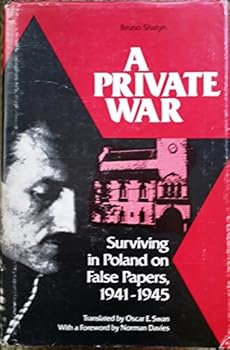A Private War: Surviving in Poland on False Papers, 1941-1945
A sensation when it appeared in Poland in 1983, the true story of Bruno Shatyn's extraordinarily successful attempts to deceive the Nazis reads like a suspense thriller, but it is much more. This... This description may be from another edition of this product.
Format:Hardcover
Language:English
ISBN:0814317758
ISBN13:9780814317754
Release Date:January 1985
Publisher:Wayne State University Press
Length:285 Pages
Weight:1.45 lbs.
Customer Reviews
1 rating
A Refreshingly Different Perspective from a Surviving Polish Jew
Published by Thriftbooks.com User , 17 years ago
In his preface, Oscar E. Swan describes prewar Polish Jewry without the usual anti-Polish bias: "In the United States, with its tradition of rapid cultural assimilation, it may be difficult for the reader to imagine the tremendous gulf separating Polish and Jewish society in Poland in the 1920s and 1930s...there were the `Litvak" Jews, recently arrived from the east and speaking little or no Polish, and the Orthodox Jews, who had kept their own dress, language, customs, religion, and schools, resisting even a modicum of accommodation to the prevailing culture. Despite the inevitable sharp social tensions created by such a situation in this fiercely Catholic country during the economic hard times of the 1930s, and despite anti-Jewish sentiment, demonstrations, and clashes at the universities, in labor unions, and in other areas of public life--often enough fomented by the Nationalist element among Polish politicians--most urban Jews in Poland before the war lived in peace and relative prosperity." (pp. xxi-xxii). In the Foreword, British historian Norman Davies adds: "In the era of Nationalism, there were Poles of the National Democratic persuasion who treated all Poland's ethnic minorities, including the Jews, with undisguised hostility, just as there were growing numbers of Jews of the Zionist persuasion who treated Poland as a country fit only to turn their backs on...it would also be inaccurate to suggest that Poland ever experienced the same level of pathological racism which has reigned at various times in neighboring Germany or Russia." (p. viii). Shatyn describes the prewar Litvaks, some of whom had migrated westward to his native Krakow (Cracow), as follows: "...for the most part they were wholesalers, supplying goods either to local stores or to shops in the many small towns in the countryside. They engaged trained bookkeepers to keep their books for tax purposes, but in addition they all carried in their pockets little notebooks in which their actual accounts were kept, accounts different from those found in the bookkeepers' neat ledgers. The information in those little books was entered in a Hebrew script, legible only to them. They were excellent tradesmen, and, universal opinion to the contrary notwithstanding, they never cheated or swindled, though they drove a hard bargain." (pp. 101-102). The reader can understand how the Poles, even if not openly exploited, naturally resented being the generation-after-generation recipients of these hard bargains. BTW, isn't tax evasion a form of swindle, and isn't defrauding the Polish government also a defrauding of the Polish nation? Bruno Shatyn (Szatyn, Schatten) was an atypical Polish Jew who, speaking fluent Polish and lacking Semitic features, survived the Nazi occupation in the open. His entire work is remarkably free of Polonophobia, and at no time does he become so Judeocentric as to ignore Polish martyrdom. For instance, he gives an eyewitness account of the slaughter of defensele





